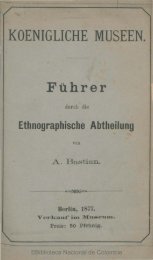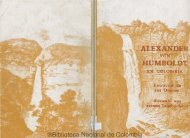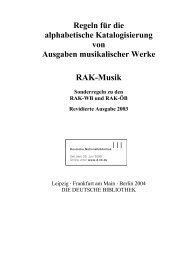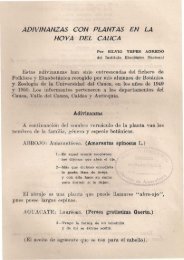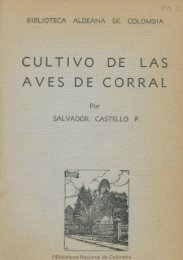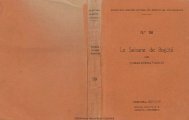Create successful ePaper yourself
Turn your PDF publications into a flip-book with our unique Google optimized e-Paper software.
<strong>©Biblioteca</strong> <strong>Nacional</strong> <strong>de</strong> <strong>Colombia</strong><br />
350 NOTES.<br />
216. Aen. is oalled "that Paris" contemptuously. The reprollch of<br />
effeminaoy is ma<strong>de</strong> aguinst the Trojans by pocts later than theHomerio<br />
times.<br />
216. Maeonin, an old name of Lydia whioh hor<strong>de</strong>red on Phrygin.<br />
Mentum, 3CC. of specification (with 8flb1lixIIB). - Mitra, a cap" fast·<br />
ened below tbe chin by ribb0ns, wbich partly covered the jaws aud<br />
temples." - On essenceu hair as a reproaoh, cf. XII. 110.<br />
217. Rapto, perf. part. of rap;o used as noun: ld, p,·cy.<br />
218. Quippe, fO"Booth, in sarcasm. -Fam. inanem, a1l idle fame;<br />
eitber "tbe reputation of Jove as a god" (C.), or his reputed relation<br />
to larbas (line 198).<br />
219. Suppliants laid hold of the altars with thcir hn,nds.<br />
225. Exspectat, linge'·B. -F. datas, a'8igned by 'he fate •.<br />
228. Bis. First, from Diome<strong>de</strong> (II. 5, 311 sqq.), nnd finally from the<br />
Greeks at the sack of Troy (Acn. II. 589 sqq.).<br />
229. Sed (p"omiBit ilium) fore.-Grav.imperiis, teemi"g ,oith empire.<br />
230. Qui regeret, prod., mit. II. 501, I.; A. & S. 264,1 and (b).<br />
Genus pro<strong>de</strong>ret, .holdd Ilaud dOllm a li"e. C. -Qui, talem ut is.<br />
232-3. Accendit, sc. eIl1ll.-Nec, etc., alld lie ""<strong>de</strong>rtoke. "0 ellterpl'i ••<br />
Mmulf for (super) Iii. 01011 ""101011.<br />
237. Summa. Noun, not adjective.-Hic- esto, be tholl our herald<br />
oftlti. me8sage. W. lind C. Hie = <strong>de</strong> hac reo<br />
244. Lum. m. resignat, openB tlle;,' eye. ill <strong>de</strong>ath. lIen., Forb., O.<br />
In accordance with the Roman custom of clQsing a friend's eyes at the<br />
moment of <strong>de</strong>ath, and afterwards opening them again when the body<br />
was laid on the funeral pile, this action is attributed to Meroury, the<br />
conductor of sonls, the object being that the <strong>de</strong>ad might see their way<br />
to the lower world. Others, either with the same translation, or taking<br />
morte as ab!. of separation, explain it, bring. the <strong>de</strong>ad to Z,fe. Other tr.<br />
of ,·uigllat." urelaxesj JJ H seals ngain; n (( oloses."<br />
247. Duri, the much.enduri"g.<br />
252. Nitens, poiBillg kim.elf all.<br />
257. Litus governed by ad. An unusual post.position of the prep.<br />
258. Avo. Atlas was tbe fatber of Maia, the mother of Mercury.<br />
283. Quid agat, what can he do' H. 486, II.; A. & S. 260, Rem. 5.<br />
289-94. A good example of the o)'atio obliquo. The imperatives of<br />
direct discourse are put in the subj., (aplellt, cog., par., digsim.); the<br />
principal <strong>de</strong>clarative clause has the acc. with the inf., - ... e tell/plOW'<br />
rom ( •• ,e),-and the subordinate clause introduced by quando takes the<br />
8ubj. For Bit (290), inasmuoh as it would be subj. in direct discourse<br />
til well, the rule of indirect question must be given. - Aditus, the



